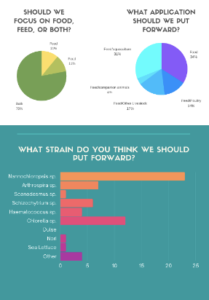In January 2021 the Department of Energy’s Office of Fossil Energy (FE) is expected to announce a new funding opportunity for projects focusing on the development of algae-based technology that utilizes carbon dioxide from power systems or other industrial sources as a feedstock.
The DOE’s announcement notes that “Research should focus on the development and engineering-scale testing of algae-based, biomediated uptake pathways to transform carbon dioxide into advanced products.”
Projects working with macroalgae, eukaryotic microalgae, and cyanobacteria will all qualify to apply.
ABO advises those interested in learning more to visit the Notice of Intent for Funding Opportunity on the DOE’s website.
The opportunity is a result of appropriations made by Congress for algae R&D in previous spending legislation that was supported by ABO.
ABO members that would like to learn more about this and other federal funding opportunities can also get in touch with ABO’s Executive Director, Dr. Rebecca White. Rebecca works closely with ABO’s Executive Policy Council, a group of members that guides all of ABO’s work with federal and state governments working to advance algae technology and markets.

 Following the Algae Food and Feed Meeting at the Algae Biomass Summit, the Algae for Food and Feed executive committee hosted a Town Hall on October 14, 2020. The Town Hall was a direct follow up to the discussion on regulatory initiatives at the Summit meeting, and the purpose was to get feedback on how many and what type of strains the Algae for Food and Feed initiative should move forward with for regulatory approval work. We are excited to share the results from the Town Hall with you as well as our next steps in seeking GRAS approval.
Following the Algae Food and Feed Meeting at the Algae Biomass Summit, the Algae for Food and Feed executive committee hosted a Town Hall on October 14, 2020. The Town Hall was a direct follow up to the discussion on regulatory initiatives at the Summit meeting, and the purpose was to get feedback on how many and what type of strains the Algae for Food and Feed initiative should move forward with for regulatory approval work. We are excited to share the results from the Town Hall with you as well as our next steps in seeking GRAS approval. 